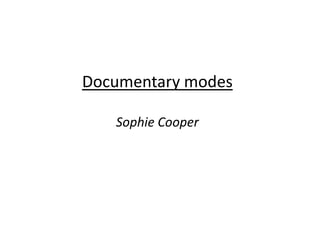
Documentary modes media sophie cooper
- 1. Documentary modes Sophie Cooper
- 2. A documentary film is one that presents people opinions of a certain matter and reveals to the audience information about factual matters. Some of the aims of a documentary film would be: 1. to film important events in society 2. Inform audience of certain issues by presenting the videos and information to go with it 3. To show different opinions 4. Interest To achieve these, ‘conventions’ are used in documentaries. Our documentary is based on child care in general and raises two particular issues within this: 1. The rising costs of child care 2. Free child care for under two’s During our documentary, we will gather footage significantly related to this subject by visiting a nursery and questioning the staff and parents. These are known as “professionals”. We will find out their opinions and what they feel about the two topics.
- 3. Actuality This is a term used for the style of documentary that films real life events, people and places. Fictional films will use actors, scripts and sets that are not real. These types of films are planned unlike documentaries which film real life events exactly as they occur. For example, vox pops (interviews with the general public giving their opinions on a matter).
- 4. Voice-over This is a commentary given by the presenter and will take place whilst a montage of images is being shown or a film is being shown in the documentary. The film maker will speak to the viewers, giving them added information, facts and opinions on the topic.
- 5. Exposition Expositional mode occurs at the beginning of the documentary and introduces the most important and interesting themes in it to grab the audiences attention from the outset. This introduces the audiences to the main parts of the documentary and means they know a bit about what it will be based on before it begins. A montage is normally used at the beginning of a documentary film to add excitement to the viewing so the audience are persuaded to carry on watching the whole of it.
- 6. Interveiws and interveiws with ‘experts’ An interview enables the viewers to be directly in touch with the people that the documentary is based around. They will hear the opinions of these people whilst they talk about the particular event. This will happen as they are prompted by questions from the presenter and will be questions that the viewers and most likely wanting to know too. Interveiws will also be used to show views of people that are disagreeing with the issue to show the viewer contradicting sides of an argument and a different range of opinions depending on who is being interviewed. The interveiws with ‘experts’ reveal a sense of authority to the reader and will perhaps be people they will listen to more whilst they share their view. The ‘experts’ will sometimes disagree with the message in the documentary but the presenter will aim to disprove them on this.
- 7. Archival/found footage • This footage is not filmed by the presenter themselves and can be from a film library or a archive. It is then put into a documentary for possibly historical purposes if the film is looking back into the past and things that are impossible for the presenter to film themselves now.
- 8. Reconstructions • Reconstructions are used a lot in documentaries and is artificial footage that is presented in a real life manner. It gives factual information to the viewers and a sense of ‘realism’ because they feel as if they are partly involved in the event. It is often hinted that the footage is artificial by the use of: • Blurring • distortion • Lighting changes • Camera levels different • Colour changes in footage
- 9. The style of our documentary is investigative as it looks into the rising costs of child care and how this effects child care businesses around the UK. Our documentary will show at 9pm on channel 4, we chose this time because it is when we feel it will get the most viewers who will want to watch a documentary about childcare. This is because, parents who have children will be the most available at this time after putting their children to sleep. Also, channel 4 is where most childcare programmes are shown eg, super nanny and one born every minute. For our documentary, we used an off screen voiceover.